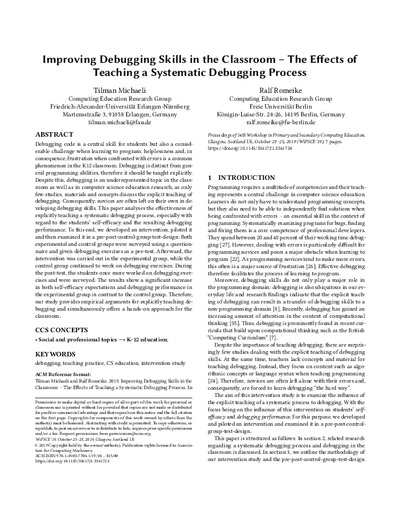Improving Debugging Skills in the ClassroomThe Effects of Teaching a Systematic Debugging Process
Publikationsdatum:
|
 |
 Zusammenfassungen
Zusammenfassungen


Debugging code is a central skill for students but also a considerable challenge when learning to program: helplessness and, in consequence, frustration when confronted with errors is a common phenomenon in the K12 classroom. Debugging is distinct from general programming abilities, therefore it should be taught explicitly. Despite this, debugging is an underrepresented topic in the classroom as well as in computer science education research, as only few studies, materials and concepts discuss the explicit teaching of debugging. Consequently, novices are often left on their own in developing debugging skills. This paper analyses the effectiveness of explicitly teaching a systematic debugging process, especially with regard to the students' self-efficacy and the resulting debugging performance. To this end, we developed an intervention, piloted it and then examined it in a pre-post-control-group-test-design: Both experimental and control groups were surveyed using a questionnaire and given debugging exercises as a pre-test. Afterward, the intervention was carried out in the experimental group, while the control group continued to work on debugging exercises. During the post-test, the students once more worked on debugging exercises and were surveyed. The results show a significant increase in both self-efficacy expectations and debugging performance in the experimental group in contrast to the control group. Therefore, our study provides empirical arguments for explicitly teaching debugging and simultaneously offers a hands-on approach for the classroom.
 Dieses Konferenz-Paper erwähnt ...
Dieses Konferenz-Paper erwähnt ...
 Personen KB IB clear | Amjad AlTadmri , Albert Bandura , Ulf Dalvad Berthelsen , Dennis J. Bouvier , Neil C. C. Brown , Tzu-Yi Chen , Malte Friese , Susanne E. Hambrusch , Wilhelm Hofmann , John T. Korb , Gary Lewandowski , Chris Mayfield , Robert McCartney , Ewald Naumann , Björn Rasch , Kate Sanders , Beth Simon , Aman Yadav , Ninger Zhou | ||||||||||||||||||||||||||||||||||||||||||||||||||||||||||||||||||||||||
 Begriffe KB IB clear |  Computer Computer computer
, computer
,  debuggen
, greenfootgreenfoot
, Informatikcomputer science
, Informatik-Unterricht (Fachinformatik)Computer Science Education
, debuggen
, greenfootgreenfoot
, Informatikcomputer science
, Informatik-Unterricht (Fachinformatik)Computer Science Education
,  Programmieren Programmieren programming
, Selbstwirksamkeitself efficacy programming
, Selbstwirksamkeitself efficacy
| ||||||||||||||||||||||||||||||||||||||||||||||||||||||||||||||||||||||||
 Bücher |
| ||||||||||||||||||||||||||||||||||||||||||||||||||||||||||||||||||||||||
 Texte |
|
 Dieses Konferenz-Paper erwähnt vermutlich nicht ...
Dieses Konferenz-Paper erwähnt vermutlich nicht ... 
 Nicht erwähnte Begriffe | Informatik-Didaktik, Informatikunterricht in der Schule |
 Tagcloud
Tagcloud
 Zitationsgraph
Zitationsgraph
 Zitationsgraph (Beta-Test mit vis.js)
Zitationsgraph (Beta-Test mit vis.js)
 Zeitleiste
Zeitleiste
 6 Erwähnungen
6 Erwähnungen 
- Debugging im Informatikunterricht (Tilman Michaeli) (2020)


- Programming in K–6 - Understanding Errors and Supporting Autonomous Learning (Jacqueline Staub) (2021)


- WiPSCE '22 - The 17th Workshop in Primary and Secondary Computing Education, Morschach, Switzerland, 31 October 2022 - 2 November 2022 (Mareen Grillenberger, Marc Berges) (2022)

- 5. Common Problems and Effects of Feedback on Fun When Programming Ozobots in Primary School (Luisa Greifenstein, Isabella Graßl, Ute Heuer, Gordon Fraser) (2022)



- 5. Common Problems and Effects of Feedback on Fun When Programming Ozobots in Primary School (Luisa Greifenstein, Isabella Graßl, Ute Heuer, Gordon Fraser) (2022)
- Informatikunterricht zwischen Aktualität und Zeitlosigkeit - 20. GI-Fachtagung Informatik und Schule (Lutz Hellmig, Martin Hennecke) (2023)


- Programmierfeedback für Kinder: Text oder Bild? - Eine Mixed-Methods-Studie in einem Roboter-Kurs (Luisa Greifenstein, Ute Heuer, Gordon Fraser) (2023)


- Programmierfeedback für Kinder: Text oder Bild? - Eine Mixed-Methods-Studie in einem Roboter-Kurs (Luisa Greifenstein, Ute Heuer, Gordon Fraser) (2023)
- WIPSCE '23 - The 18th WiPSCE Conference on Primary and Secondary Computing Education Research (Sue Sentance, Mareen Grillenberger) (2023)
- Impact of Hint Content on Performance and Learning - A Study with Primary School Children in a Scratch Course (Luisa Greifenstein, Markus Brune, Tobias Fuchs, Ute Heuer, Gordon Fraser 0001) (2023)


- Impact of Hint Content on Performance and Learning - A Study with Primary School Children in a Scratch Course (Luisa Greifenstein, Markus Brune, Tobias Fuchs, Ute Heuer, Gordon Fraser 0001) (2023)
- WIPSCE '24 (Tilman Michaeli, Sue Sentance, Nadine Bergner) (2024)



- Systematic Debugging of Logical Errors in Source Code (Felix Ziemann, Florian Reuß) (2024)



- Systematic Debugging of Logical Errors in Source Code (Felix Ziemann, Florian Reuß) (2024)
 Anderswo finden
Anderswo finden
 Volltext dieses Dokuments
Volltext dieses Dokuments
 |  Improving Debugging Skills in the Classroom: Artikel als Volltext ( Improving Debugging Skills in the Classroom: Artikel als Volltext ( : :  , 1017 kByte; , 1017 kByte;  : :  ) ) |
 Anderswo suchen
Anderswo suchen 
 Beat und dieses Konferenz-Paper
Beat und dieses Konferenz-Paper
Beat hat Dieses Konferenz-Paper während seiner Zeit am Institut für Medien und Schule (IMS) ins Biblionetz aufgenommen. Beat besitzt kein physisches, aber ein digitales Exemplar. Eine digitale Version ist auf dem Internet verfügbar (s.o.). Es gibt bisher nur wenige Objekte im Biblionetz, die dieses Werk zitieren.














 Biblionetz-History
Biblionetz-History